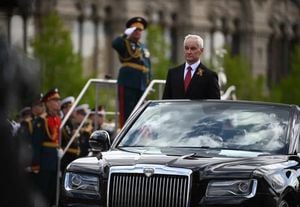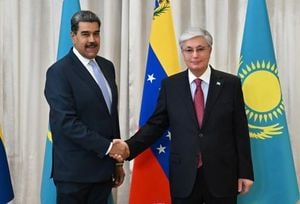On May 6, 2025, India launched a significant military operation against Pakistan, citing the need to dismantle what it described as "terrorist infrastructure" located in both Pakistan and Pakistan-administered Kashmir. This marked a major escalation in the long-standing tensions between the two nuclear-armed neighbors, with reports of multiple explosions heard in the city of Muzaffarabad, as captured in video footage shared by Reuters.
The offensive, dubbed "Operation Sindoor," was launched in response to a brutal attack on Hindu tourists in Indian-administered Kashmir on April 22, 2025, where Islamist militants killed 26 individuals, marking one of the deadliest assaults on civilians in nearly two decades. The Indian government stated that the operation aimed to target sites from which attacks against India were allegedly planned and directed.
On May 7, 2025, India reportedly struck nine locations across Pakistan and Pakistani Kashmir, resulting in at least three confirmed deaths and several injuries. As the conflict intensified, heavy shelling and gunfire were reported along the Kashmir frontier, with both armies exchanging fire in at least three different areas. Witnesses and police officers confirmed hearing loud explosions and artillery fire, along with the sound of military jets overhead.
Pakistani officials responded by stating that India had launched missiles at various locations, including two mosques, which they claimed were civilian targets rather than militant camps. Khawaja Muhammad Asif, Pakistan's Defence Minister, asserted that the sites hit by Indian forces were not associated with any terrorist activities, calling India's claims "false." The Pakistani military reported that at least 12 individuals were injured as a result of the strikes.
In a statement regarding the operation, the Indian government emphasized that its actions were "focused, measured, and non-escalatory in nature," asserting that no Pakistani military facilities had been targeted. The Indian armed forces described the operation as a necessary response to the threats posed by terrorist groups operating from across the border. A spokesperson for the Indian army remarked on social media, "Justice is served," following the strikes.
As the situation escalated, the Pakistani government declared a state of emergency in its populous Punjab province, with hospitals and emergency services placed on high alert. The chief minister of Punjab confirmed the emergency status, reflecting the heightened concerns over potential further hostilities.
U.S. President Donald Trump weighed in on the rising tensions, labeling the situation "a shame" and expressing hope for a swift resolution. His comments highlighted the international concern regarding the volatile relationship between India and Pakistan, particularly given their nuclear capabilities.
In the aftermath of the strikes, the benchmark NSE Nifty 50 index in India fell by 1.19%, reflecting the market's reaction to the escalating conflict. Additionally, reports indicated that power was cut off in Muzaffarabad, the capital of Pakistani Kashmir, following the explosions, further exacerbating the humanitarian situation.
The name of the operation, "Sindoor," carries significant cultural weight, referencing the traditional red vermilion worn by married Hindu women, symbolizing protection and marital commitment. This choice of name is seen as a poignant reminder of the lives lost in the recent attack on Hindu tourists, as it reflects the deep emotional scars left by such violence.
As both nations brace for potential further conflict, the international community watches closely, urging both sides to exercise restraint. The ongoing violence underscores the fragile nature of peace in the region, where historical grievances and territorial disputes continue to fuel animosity.
In summary, the military operations initiated by India have reignited fears of a broader conflict in South Asia. With both nations now on high alert, the potential for further escalations remains a pressing concern, not only for the countries involved but for global stability as well. As diplomatic efforts are called for, the hope is that dialogue can replace the current cycle of violence, paving the way for a more peaceful resolution to the enduring conflict.




